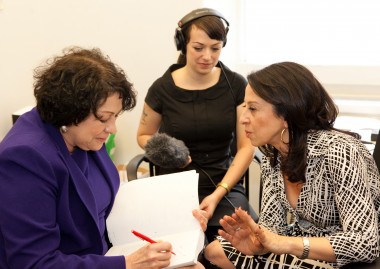Tag: Radio programs
Follow Planet Money’s Kickstarted T-shirt odyssey
The cotton T-shirt, a public radio merchandising staple, is front-and-center in a new multimedia project from NPR's economics reporting unit Planet Money.Comedian Dave Hill will move into Best Show slot on WFMU
New Jersey–based freeform community radio station WFMU will replace The Best Show on WFMU in January with a program hosted by comedian ...Localore project Black Gold Boom gets funding for 2014 documentary, transmedia work
The grant will fund a film focusing mainly on the oil boom's effects on Native tribes.CPB to support more collaborative journalism projects
CPB will devote $2.5 million to reporting projects spearheaded by stations and national producers, President Patricia Harrison announced Nov. 12 at the ...With board support gone, KBOO leader calls it quits
The Portland community station has new leadership at the top and on its board after a failed bid to revamp workplace practices.AIR, PRNDI partner on guidelines for radio freelancers
The Association of Independents in Radio and Public Radio News Directors Inc. are collaborating on a set of guidelines for local pubradio ...Foundation to sell 87-year old commercial classical radio station
KDB in Santa Barbara, Calif., one of the few remaining commercial classical radio stations, has been put up for sale by the ...Decade of StoryCorps chats inspires NPR and PBS specials, book and gala
StoryCorps begins marking its 10-year anniversary this week with a special series airing on NPR’s Morning Edition. The segments include an interview with StoryCorps ...NPR to announce new voice of underwriting credits
NPR plans to unveil tomorrow the name of the on-air talent who has been chosen to voice its underwriting credits as a ...WFUV seeks membership boost with new mix of music
New York’s WFUV has expanded its music mix and dropped NPR newscasts, with a goal of enticing more listeners to become members. Starting ...After Talk of the Nation, Neal Conan’s first gig takes him to Greenland
Neal Conan’s first foray out of the studio in 11 years took him very far from the studio indeed — all the ...Gambit to go independent opens new doors for Hinojosa
In launching her own media company, Maria Hinojosa sought to bring a “consistent presence” of a Latina journalist to PBS and take ...Listeners who campaigned for classical music on WFIU put own interests over public service
Classical music is a big part of the cultural fabric of Bloomington. But WFIU wasn’t aiming to eliminate local music programming.KCRW brings live Morning Becomes Eclectic performances to YouTube
Select musical performances from KCRW-FM’s signature show Morning Becomes Eclectic are now streaming live on YouTube. The Los Angeles station kicked off the new ...Radio Ambulante partners with PRI to produce English-language content
Radio Ambulante, the Spanish-language storytelling podcast and radio program, is the first show to be backed by Public Radio International’s New Voices ...





